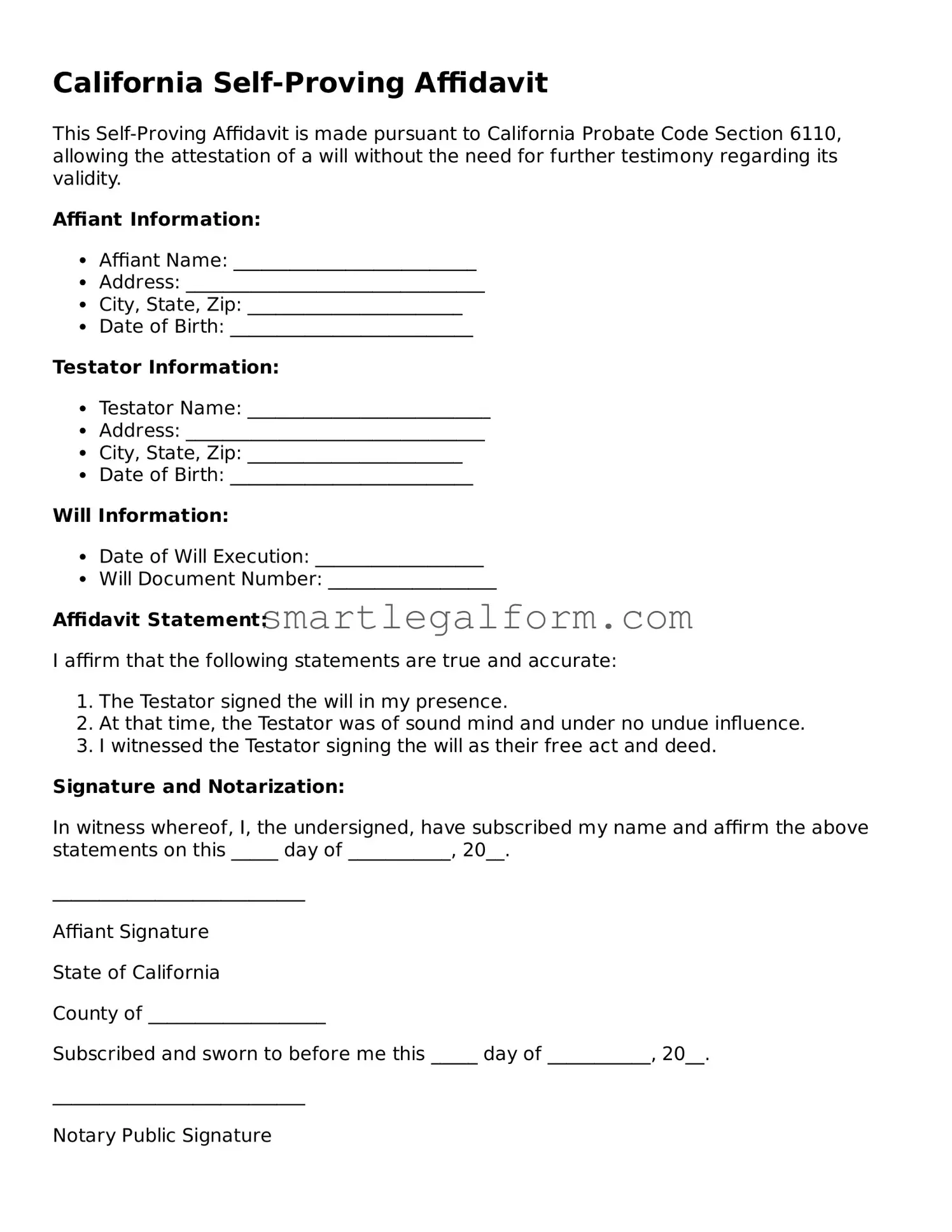Printable California Self-Proving Affidavit Document
Form Preview Example
California Self-Proving Affidavit
This Self-Proving Affidavit is made pursuant to California Probate Code Section 6110, allowing the attestation of a will without the need for further testimony regarding its validity.
Affiant Information:
- Affiant Name: __________________________
- Address: ________________________________
- City, State, Zip: _______________________
- Date of Birth: __________________________
Testator Information:
- Testator Name: __________________________
- Address: ________________________________
- City, State, Zip: _______________________
- Date of Birth: __________________________
Will Information:
- Date of Will Execution: __________________
- Will Document Number: __________________
Affidavit Statement:
I affirm that the following statements are true and accurate:
- The Testator signed the will in my presence.
- At that time, the Testator was of sound mind and under no undue influence.
- I witnessed the Testator signing the will as their free act and deed.
Signature and Notarization:
In witness whereof, I, the undersigned, have subscribed my name and affirm the above statements on this _____ day of ___________, 20__.
___________________________
Affiant Signature
State of California
County of ___________________
Subscribed and sworn to before me this _____ day of ___________, 20__.
___________________________
Notary Public Signature
Common mistakes
When filling out the California Self-Proving Affidavit form, individuals often make several common mistakes that can lead to complications later on. One frequent error is failing to provide all required signatures. The form requires signatures from both the testator and witnesses. Omitting any of these can invalidate the affidavit.
Another mistake is not including the correct date. The date of signing is crucial as it establishes when the affidavit was executed. If the date is missing or incorrect, it may create confusion regarding the validity of the document.
People sometimes neglect to ensure that the witnesses are present during the signing. The affidavit must be signed in the presence of the witnesses to be valid. If the witnesses were not present, their signatures would not hold up in court.
Some individuals also make the mistake of using outdated forms. It is important to use the most current version of the Self-Proving Affidavit. Using an outdated form can lead to legal issues, as laws and requirements may have changed.
Additionally, individuals may fail to provide accurate information regarding the testator's mental capacity. The affidavit should affirm that the testator was of sound mind when signing. If this statement is inaccurate, it could challenge the legitimacy of the will.
Lastly, people often overlook the importance of notarization. While notarization is not always required for a Self-Proving Affidavit, having it notarized can add an extra layer of authenticity. Failing to do so might raise questions about the document's validity.
Dos and Don'ts
When filling out the California Self-Proving Affidavit form, it is important to follow certain guidelines to ensure the document is valid and effective. Here are five things you should and shouldn't do:
- Do ensure that all information is accurate and complete.
- Do have the form signed in the presence of a notary public.
- Do keep a copy of the signed affidavit for your records.
- Don't rush through the process; take your time to review the form.
- Don't forget to check for any specific state requirements that may apply.
Other Self-Proving Affidavit State Forms
Self Proving Will Affidavit - This document can be an essential part of effective estate planning.
Understanding the significance of a Living Will is crucial for anyone contemplating their healthcare decisions. This legally binding document enables individuals to articulate their medical preferences, particularly in situations where they may be unable to communicate. For further information, explore the comprehensive Living Will guidelines available at Living Will form resource.
Texas Self Proving Affidavit - Counters potential challenges by clarifying the testator's intentions.
Self Affidavit Meaning - Both the witnesses and the testator must affirm their identities and the circumstances of the will’s signing.
Similar forms
A Self-Proving Affidavit is an important document in the estate planning process, particularly in relation to wills. It serves to validate a will by confirming that the testator (the person who made the will) signed the document in the presence of witnesses. There are several other documents that share similarities with the Self-Proving Affidavit. Below are four such documents, each with a brief explanation of how they relate to the Self-Proving Affidavit.
- Will: A will is a legal document that outlines how a person wishes to distribute their assets after their death. Like the Self-Proving Affidavit, a will must be executed properly to ensure its validity. Witnesses often play a crucial role in both documents, helping to confirm that the testator was of sound mind and acted voluntarily.
- Durable Power of Attorney: This document allows someone to make decisions on behalf of another person if they become incapacitated. Similar to a Self-Proving Affidavit, a Durable Power of Attorney often requires notarization or witnesses to ensure that the principal (the person granting authority) is making informed and voluntary decisions.
- Marriage Certificate: An official document that establishes the legal union between two individuals, serving as a crucial record for various personal, legal, and financial purposes. Newlyweds can obtain their certificate through resources like TopTemplates.info to ensure their marriage is recognized by law.
- Living Will: A Living Will outlines a person's wishes regarding medical treatment in the event they cannot communicate their decisions. Like the Self-Proving Affidavit, it must be executed in accordance with specific legal requirements, often involving witnesses or notarization to confirm that the individual’s wishes are authentic and voluntary.
- Trust Agreement: A Trust Agreement is a legal document that creates a trust, which can manage assets for beneficiaries. Similar to the Self-Proving Affidavit, it often requires signatures from the grantor and witnesses to ensure that the document is valid and reflects the true intentions of the grantor.
